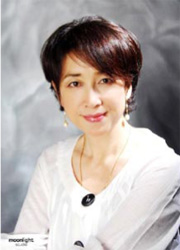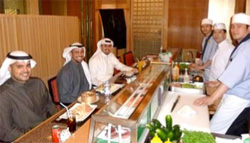Home > Highlighting JAPAN > Highlighting Japan AUGUST 2011 > Kei Puts J in Kuwait
Highlighting JAPAN
COVER STORY: The Colors of Cool
Kei Puts J in Kuwait
The Ministry of Agriculture, Forestry and Fisheries annually presents an Award for the Overseas Promotion of Japanese Food. The Japan Journal’s Osamu Sawaji interviewed the recipient of the 2010 award, Keiko Mutoh, owner of the Japanese restaurant Kei.

Keiko Mutoh
Credit: COURTESY OF KEIKO MUTOH
“My father used to run an offshore oilfield-related operation in Kuwait, and opened Kuwait’s first Japanese restaurant in 1980,” says Keiko Mutoh, owner of Kei. “At the time, most of the customers were non-Kuwaiti residents such as Japanese or Westerners. Japanese food was very rare, and eating Japanese food had a kind of status.”
From around the mid-1980s, Mutoh started to help her father with his work, going back and forth between Japan and Kuwait. In 2003, Mutoh took over the business after her father passed away. Presently, she runs two restaurants in Kuwait and one in Bahrain serving authentic Japanese cuisine such as sushi and tempura. The difference between now and 1980 is that around 90% of her clientele are Kuwaitis.

Kuwaiti diners enjoy a Japanese meal at Kei in Kuwait.
Credit: COURTESY OF KEIKO MUTOH
Following the nuclear accident precipitated by the Great East Japan Earthquake and the Kuwaiti government’s subsequent ban on all imports of comestibles from Japan, Kei has had to draw on everyday ingredients such as soy sauce, miso and nori from stock.
Mutoh says, however, “If the ban on imports continues, we’ll have to switch to ingredients made in other Asian countries, and I’m worried that might affect the flavors we seek.”
Mutoh has been busy supporting the disaster-affected areas in Japan through charity activities in Kuwait, in one case providing Japanese food to a Kuwaiti family on their return to Kuwait from quake-hit Miyagi Prefecture.
“So many people here have expressed their sympathy for Japan and encouragement to me,” says Mutoh, who adds that her business has not so far been adversely affected by the quake. “I would like Kei and Kei Café to continue to be centers for the transmission of Japanese food culture and hubs for cultural exchange,” she says.
© 2009 Cabinet Office, Government of Japan






